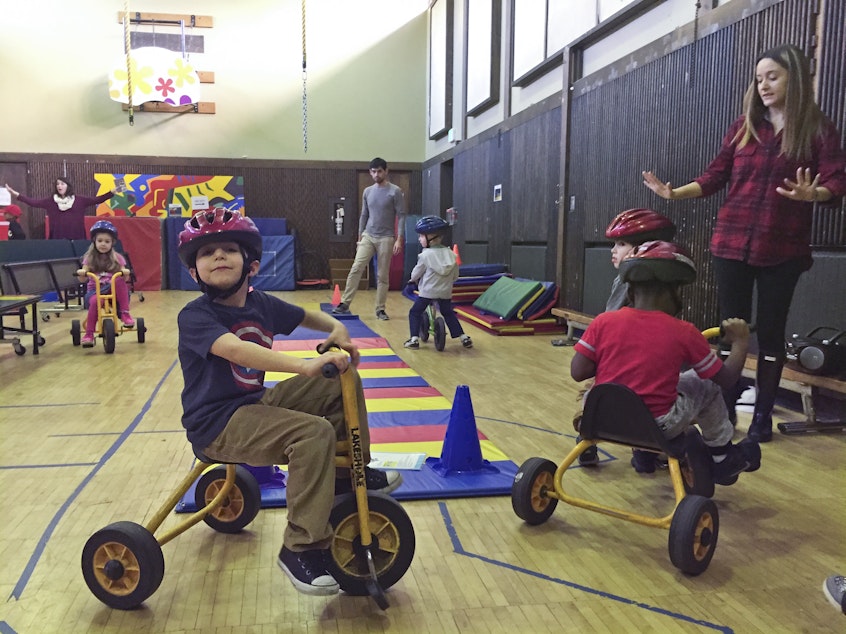This Special Needs Kindergarten In Seattle Is Losing Its Funding

Cinthia Portugal is a mom of 4-year-old twins with autism, and she is scrambling to find a kindergarten for her sons.
Her boys currently attend preschool the Experimental Education Unit, and that’s where she thought they would go for kindergarten. But Seattle Public Schools announced last month it would no longer pay for kindergarten at the school, which combines students with and without disabilities.
"Everything I learn here makes me a better mom to my boys every day," Portugal said. "I would have been so lost if I didn’t have these teachers and therapists and doctors and researchers all right here on the premises."
Portugal said her sons are thriving from having typically developing peers as role models and being fully included in every aspect of the school day. She hasn’t been able to find that level of inclusion at any other kindergarten.
Principal Chris Matsumoto said he received no warning that the school’s funding was in jeopardy.
Sponsored
"I honestly am not sure why this is happening now. I was caught really off guard," Matsumoto said.
The students learn side-by-side in the same classroom, with teachers giving extra help to students when they need it.
The EEU, which is based at the University of Washington, has developed this full-inclusion model over three decades. And for years, Seattle Public Schools has sent students with disabilities to the preschool and kindergarten.
The district turned down multiple requests for an interview, but in a written statement, the district said that "the past use of special education funds for general education services has been identified as a compliance issue that could jeopardize funding" to the district.
Matsumoto disputes that.
Sponsored
"We’ve set up the contract really specifically to make sure that it is only paying for students receiving special education services," he said, adding that the EEU covers the cost of general education students through fundraising.
The district said the Washington State Auditor’s Office recently flagged this funding model. But an official with the auditor’s office told KUOW that nothing in the audit notes was relevant to the EEU kindergarten.
At most schools, students with special needs are pulled out of class for part of the day for extra services. Or they may be kept in special education classes all day.
On a recent morning in the kindergarten gym class at the EEU, there weren’t enough tricycles. That was by design.
"I want to go on the pretty yellow bike," a little boy told his teacher.
Sponsored
"Who are you going to ask for a turn?" she prompted him.
Moments later, the boy wheeled away on a yellow bike. The previous user had agreed to switch to a scooter.
Social-emotional lessons like these – communication, problem-solving, self-regulation – are woven into every subject at the EEU.
"I know definitively there are no other programs, no other schools like the EEU. Not public, not private," Portugal said.
That unique quality is partly why the district is cutting funding. In its written statement, the district said parents have complained that the EEU program is inequitable because there aren’t enough seats for every family who wants one.
Sponsored
"It seems to be symptomatic of kind of a general march toward standardization," said Liza Rankin, a parent activist who has had two children at the EEU. Rankin sees the district’s move as part of a trend: Seattle Public Schools pulling money, staff and resources from alternative programs.
She points to the recent closure of a small alternative high school for at-risk students and the removal of teachers and leaders from two other alternative schools.
Rankin says the district should be raising the bar – not lowering it in the name of equity.
"Why would you eliminate a program that really should be expanded?” she said. “That should be in every kindergarten? And that more kids should have access to?”
The school district said it is looking for a solution to serve the families who’d counted on attending the EEU kindergarten.
Sponsored
In the meantime, it said, the EEU would need to find a new funding source.

